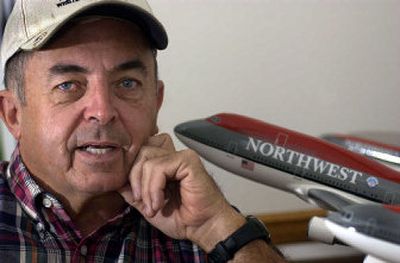Pensions on the line

MINNEAPOLIS — Murray Specktor, a first officer who flew Boeing 747-400s on Northwest Airlines’ Asian routes, took early retirement this year at the age of 52, knowing he wouldn’t get a huge pension. But now that the carrier has filed for bankruptcy protection, he fears his monthly payments will be cut as much as 70 percent.
“I just wanted to move on and do some other things,” he said from his home in Palm Springs, Calif. “I retired with a reasonable expectation that the pension I retired on would be available to me.”
Northwest Airlines Corp. of Eagan, Minn., and Atlanta-based Delta Air Lines Inc., both filed for Chapter 11 bankruptcy on Sept. 14. Northwest officials have said they hope to preserve the pension benefits employees have accrued so far. Delta officials have not said they plan to terminate their plans, but that their future will largely depend on the airline’s ability to fund them.
If Specktor’s fears come true and the carriers take the next step of turning over the plans to the federal government, tens of thousands of other highly-paid employees and retirees at the carriers could face sharp cutbacks in their monthly retirement checks.
The Pension Benefit Guaranty Corp., the federal agency set up to guarantee retiree pensions, already has raised red flags about its own solvency after having thousands of pension plans dumped on it by hundreds of steelmakers, other airlines and companies across a spectrum of industries.
Adding to the PBGC’s strain, say some insiders, is a category of corporate turnaround specialists sometimes known as vulture investors, for whom jettisoning the underfunded pension plans of troubled companies is a common strategy. Wilbur Ross — who turned a handsome profit when he used the strategy in buying up five failing steel companies including Bethlehem Steel and Weirton Steel — recently told the New York Times he’s looking at investing in struggling auto parts makers such as Delphi Corp.
When the government takes over a pension plan, the payouts usually don’t change. But with airlines, pilots and sometimes other employees can take enormous hits when a plan is turned over to the PBGC. Federal law limits annual pension payments for plans canceled in 2005 to $45,613 for people who retire at age 65.
Pilots must retire by age 60, but since the rules that govern the PBGC penalize retirements before 65, their maximum annual payment in a plan canceled this year would be $29,649, according to the PBGC.
That would be a big hit for Les McNamee, who retired from Northwest in 2001 and draws an annual pension of $94,000. But McNamee, who still works full-time flying corporate jets, said he’s saved diligently and is more concerned for other pilots than for himself.
“Some of the people who didn’t plan ahead are going to get hurt, and that’s the sad part,” he said. “It’s a shame … that large corporations can just walk away from their obligations.”
Some people may have trouble sympathizing with well-paid pilots, said Norman Stein, a pension expert at the University of Alabama School of Law. But he pointed out that for many pilots, it’s almost too late to make up the difference.
“I think there’s something wrong with a system that can change, with the stroke of a pen, a $150,000 pension to a $35,000 pension overnight,” Stein said.
Both Northwest and Delta say that to preserve those pensions, Congress will have to change the law to stretch out the time they have to properly fund the plans. If Congress doesn’t, experts agree, the airlines’ chances of sparing their pension plans are small.
Northwest has said that in the longer term, it wants to freeze its current defined benefit pension plans and switch to cheaper defined contribution plans, such as 401(k)s, which are retirement savings accounts funded by employee contributions. The chairman of Delta’s pilots union has said that Delta has warned that it will cease payment of non-qualified retirement benefits to retired pilots, and that it will not make future contributions to the pilots’ pension plan.
Douglas Elliott, president of the Center on Federal Financial Institutions, which monitors the PBGC, predicted that Northwest and Delta will come under heavy pressure from investors to turn their pensions over to the government.
“It’s the only obligation of any size where they can hand over a substantial part of it to a third party,” Elliott said.
PBGC spokesman Randy Clerihue said it’s not as easy as some people think.
“You have to meet the legal test, and Congress set a pretty high bar. It’s turn over your pension plan or go out of business,” Clerihue said.